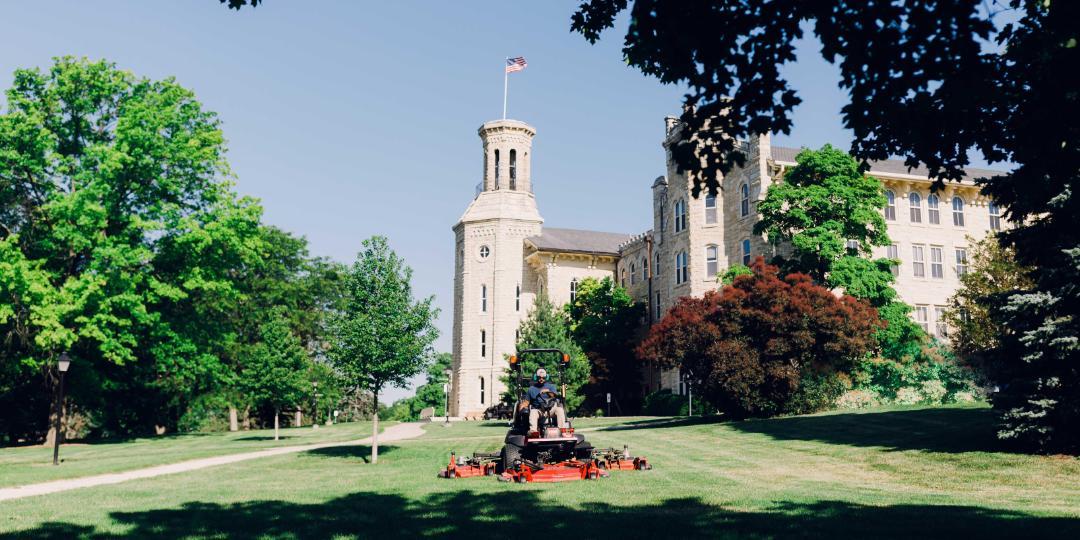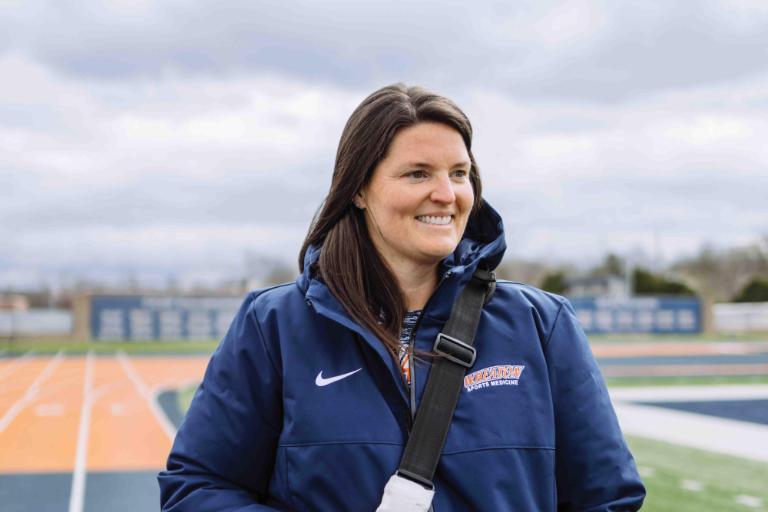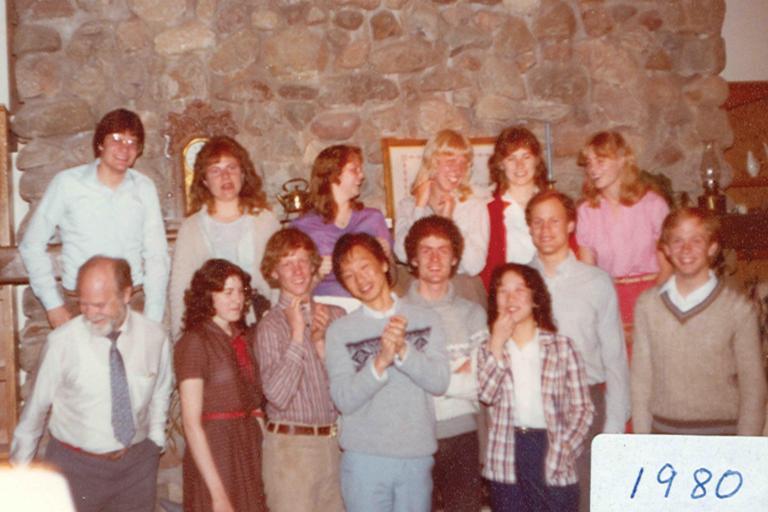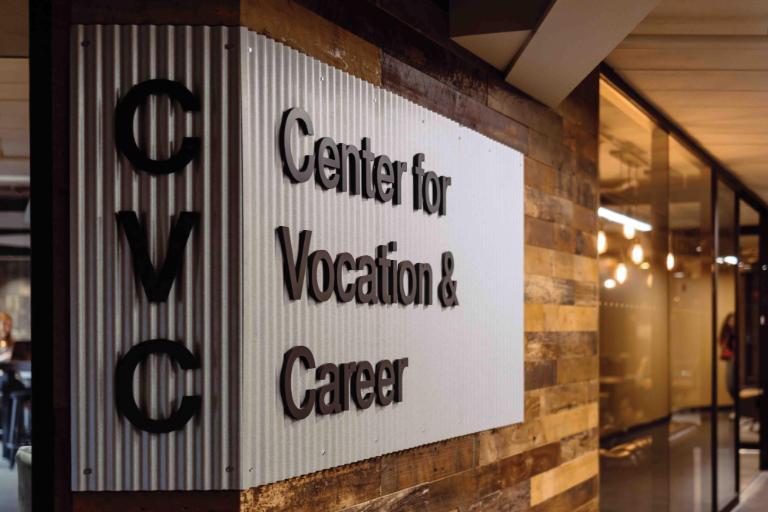Closer to Eden
No matter the season, Wheaton College’s Landscape Operations team pours perseverance and prayer into their efforts to create campus grounds that are communal spaces for both worshipful work and rest.
Words: Kailin Richardson ’20
Photos: Josh and Alexa Adams
PREPARING THE LAND
But mist would come up from the earth and water all the ground” (Gen. 2:6, CSB).
Garden hoses waved across Edman Chapel’s flower beds, tossing an iridescent spray into the air as the morning temperature climbed to the upper 90’s. Poised canna lilies rose to meet the watering. Rose bushes sprawled against the brick under Edman’s windows. Blanchard’s trees swayed to the hum drifting across campus’ signature piece of land as mowers and weed wackers sent notes back and forth. And all of it buzzed with energy as Wheaton College’s Landscape Operations team choreographed the landscape’s dance, weeding and planting and watering under the sun.
Compared to the bustle of the school year, campus in the summer is both idyllic and exciting.
That is, until I wandered around Blanchard to the back lawn and found one of my favorite spots torn to pieces. Trees and picnic tables where friends and I lounged to read were gone. Mounds of dirt, orange plastic gates, and gaping trenches with huge pipes resting at the bottom filled the space and criss crossed over campus. I kept hoping for a glimpse of spotless green, but there was nothing untouched in the distance. As I noticed gaps where trees would be, my heart sank a little.
And yet, for the Landscape Operations team, this was just the beginning—a new opportunity to make campus even more of an artistic accomplishment than it was before. To Landscape Operations Manager Tom Trayser, this was a blank canvas waiting for the next design.
Before coming to Wheaton, Trayser spent over two decades in both corporate and church landscape design. Four years into leading Landscape Operations, Trayer’s passion for the job is evident—he sees Wheaton as one of “the Father’s own personal landscapes,” and as such, his role is filled with purpose and responsibility. Whether he’s overseeing design, construction, or management, he ties the work back to the original Designer.

Planting canna lilies at Wheaton College’s main entrance.
This is where Trayser encourages the team to start—not with hands in the dirt, but with a desire to learn from the Creator. Even as the campus is thrown into the tumult of installing a new HVAC system, there’s a plan in place to “move campus closer to Eden.” This is the team’s motto and guiding force.
It’s clear that to Trayser and his team, this mindset is why the job matters so much. They’re tasked with shaping the land, creating something beautiful. And while the beauty of the campus matters in itself, shaping the land is also a way to shape its people.
When school is out for the year, summer staff joins the team, usually consisting of students from both Wheaton and other schools nearby. Building relationships with them is a highlight for the team. Trayser describes young students as like clay: Their lives are just beginning to be shaped by the world around them, and getting to play a part in that before sending them out into the world is rewarding.
Lukas Mitchell is in charge of the summer staff, and as a result, this season of work is his favorite. When he discovered that working a desk job wasn’t for him, he started working outdoors with trees. Eventually, he found what he was looking for in a job with Wheaton’s Landscape Operations—an opportunity for connection. After six years, he still loves getting to know the students who work on staff for the summer.
“We’re not just trying to get them to work for us and make campus look more like Eden, but also to find out what’s in their hearts, and get to know them and love on every one of them,” he said.
The summer staff, in turn, are invested in the work they do. They come to campus prepared in rolled up jeans, straw hats, work tees, and boots, ready to brave the humid heat and learn. While planting more canna lilies in the traffic loop at Wheaton’s main entrance, Annika Van Dyke ’24 used the term “visual energy” to explain the vertical contrast the flowers provide campus. An applied health sciences major and art minor, she loves getting the chance to be outside and participate in design. But when I asked about her favorite part of the job, she paused to consider, the sun glaring behind her. “The camaraderie that comes with it,” she decided, cheerfully and confidently continuing her work.
As the team interacts with summer staff and looks forward with them to the next stage of life, they’re also preparing a place for incoming students.
For Mitchell, getting ready for the rush of students in the fall isn’t new. Growing up in Wheaton, he greeted students as a child selling lemonade or hot chocolate outside of the Saint and Elliot apartments by his house. Although it might look a little bit different for his position with Landscape Operations, he’s still excited about making campus a welcoming space.
He tells himself, “I’m going to make this campus look good for this person when they come in as a freshman. And it’s that pride of seeing them and then saying, ‘I am doing this for you.’”
Jackson Schmid ’21 can testify to this. He visited Wheaton’s campus before enrolling, and even though he wasn’t a Christian at the time, he felt drawn to the space. He thought, “This landscape is beautiful. I could see myself being here.” This is why he credits his enrollment in part to Landscape Operations. Welcomed by Blanchard lawn’s old and gentle trees situated within an organic design, rather than a perfectly manicured landscape, he found a campus with room for his changing story.
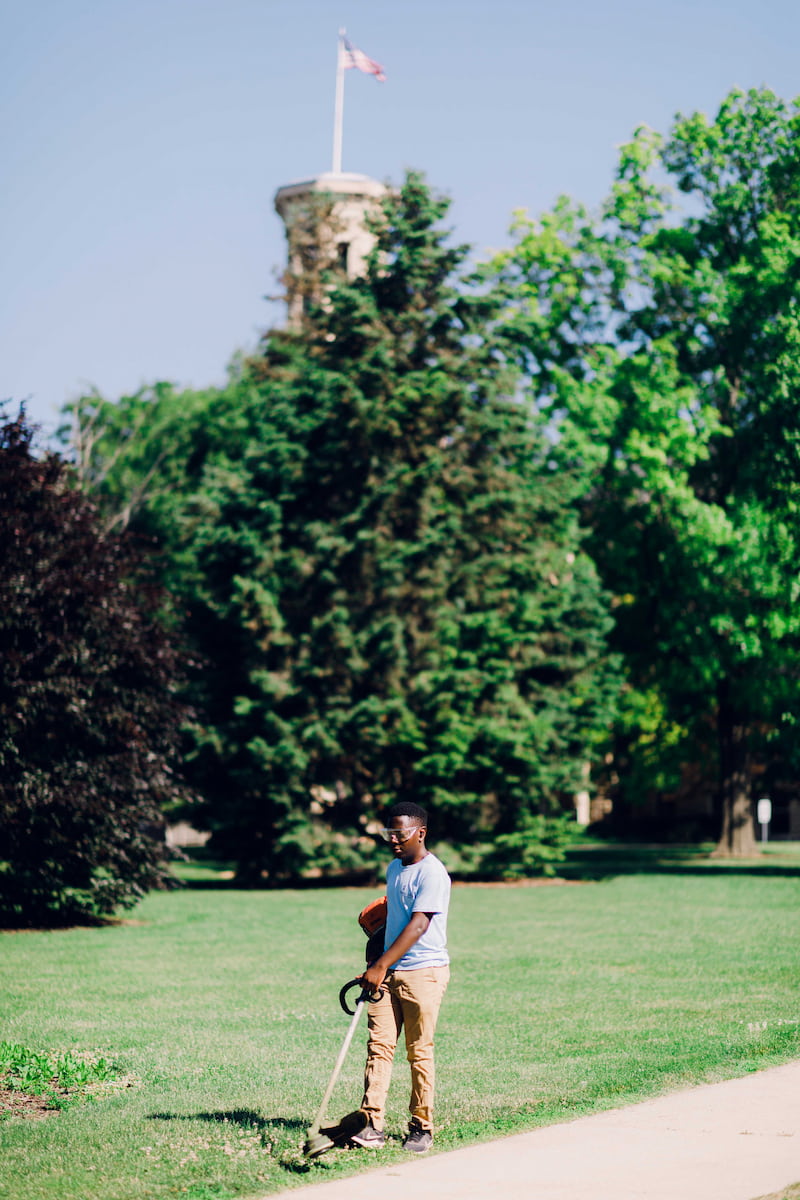
Edging along the sidewalks that crisscross over Blanchard Lawn.
TRANSFORMING THE GARDEN
“The Lord God caused to grow out of the ground every tree pleasing in appearance and good for food” (Gen. 2:9a).
When the semester begins, Wheaton’s campus is full of young, intelligent, growing students who are excited to learn from the spaces around them. As each plant and lawn around campus changes and needs tending, each student’s life—literally and spiritually—will shift as the seasons go by.
“It really is the same,” Trayser said, “We learn things from the landscape that we can apply to our personal lives, but we also learn from the community that we have here on how to best care for the campus. It kind of goes both ways.”
When Schmid arrived on campus as a freshman, he joined the football team. The summer before his final semester, he joined Landscape Operations when Mitchell, who helps with the football team, recruited Schmid to join. As he looked for ways to learn more, Schmid found that parallels in the job helped him deepen his faith. The landscape gave him tools for change, even as it shifted under the crew’s hands, whether they weeded, pruned, or watered. This was an ongoing, and sometimes grueling process. Whether he was tending his personal faith or a flower bed, he came face-to-face with the patience, care, and time required to grow.
“There are so many parallels that we get to think about during our days in the grounds crew,” Schmid explained. “There’s Scripture that talks about stress being like weeds in our life, and they kind of choke out all joy. And we get to be a part of literally pulling the weeds out with our hands. But there’s a sense of, if you pull spiritual weeds from your life, it’s only then that you can fully blossom and be all who God intended you to be.”
Fall begins a period of removal for the team. Drifting leaves and fading flowers need attention before winter so they’ll be ready to bloom again. The team cares for campus using knowledge of what will truly cause a plant to change and grow into its most flourishing self. And of all the metaphors and parallels, the process of coaxing the landscape toward its original potential is best shown in the process of pruning.
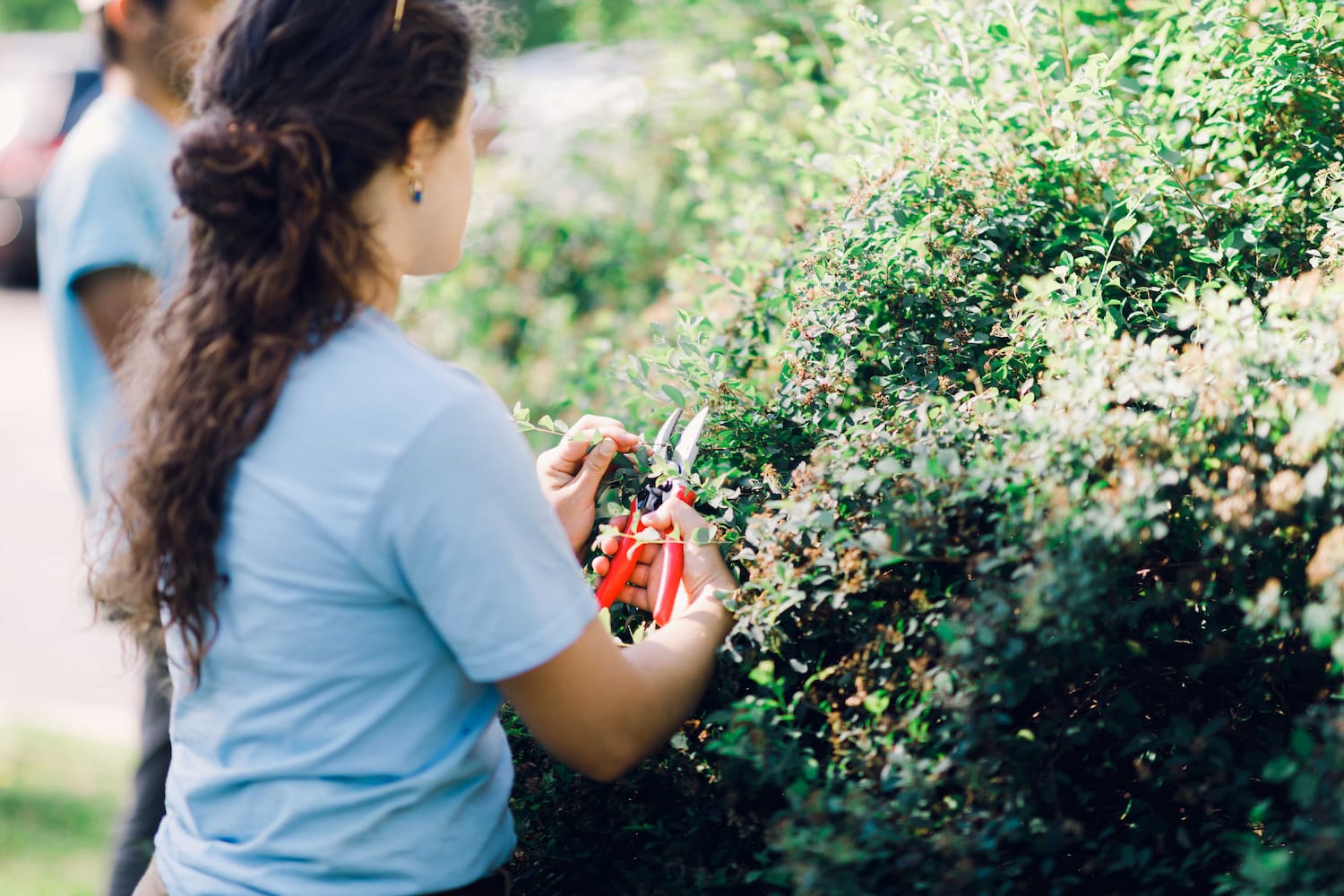
Pruning campus shrubbery in preparation for the colder months and new growth.
Pruning is a slow, methodical job. It’s selective—the gardener picking and choosing branches or dead buds to gently clip, careful of the rest of the plant. They only remove what is dying, dead, or liable to cause further damage. The end goal isn’t removal in and of itself: it’s change and support, providing guidance to the plant as it grows in its season.
For Mitchell, who spends a lot of time with trees, pruning is important to different aspects of his life. “Everything needs pruning,” he observed. “There are things in my life that need pruning and sharpening. There are things that grab a hold of us that will then bring us down and will be a hindrance. There are things that are dead in our lives that need to be removed.”
Pruning can be somber and precise, but still messy as clippings fall to the ground. And yet, every member of the crew sees it as something special. As the person responsible for instructing the team and teaching them the ways of the land, Trayser lights up when he talks about pruning.
“How great is pruning, right?” he exclaimed, throwing his hands up. “We get to keep that beautiful, natural texture that God designed into each plant.” And it matters to the team that this job is done with their hands. Without power sheers, they give the plants the opportunity to grow best. “So, the plant fruits in season and flowers the way God designed it to be,” Trayser explained.
Much of gardening involves interacting with what’s dying. At times, even pruning may feel like an isolated act, lonely and without promise. In the end, though, this will always be for the sake of the plant and how it’s meant to grow. And transforming land and lives is something Landscape Operations does together—no matter what difficulties the season has to bring.
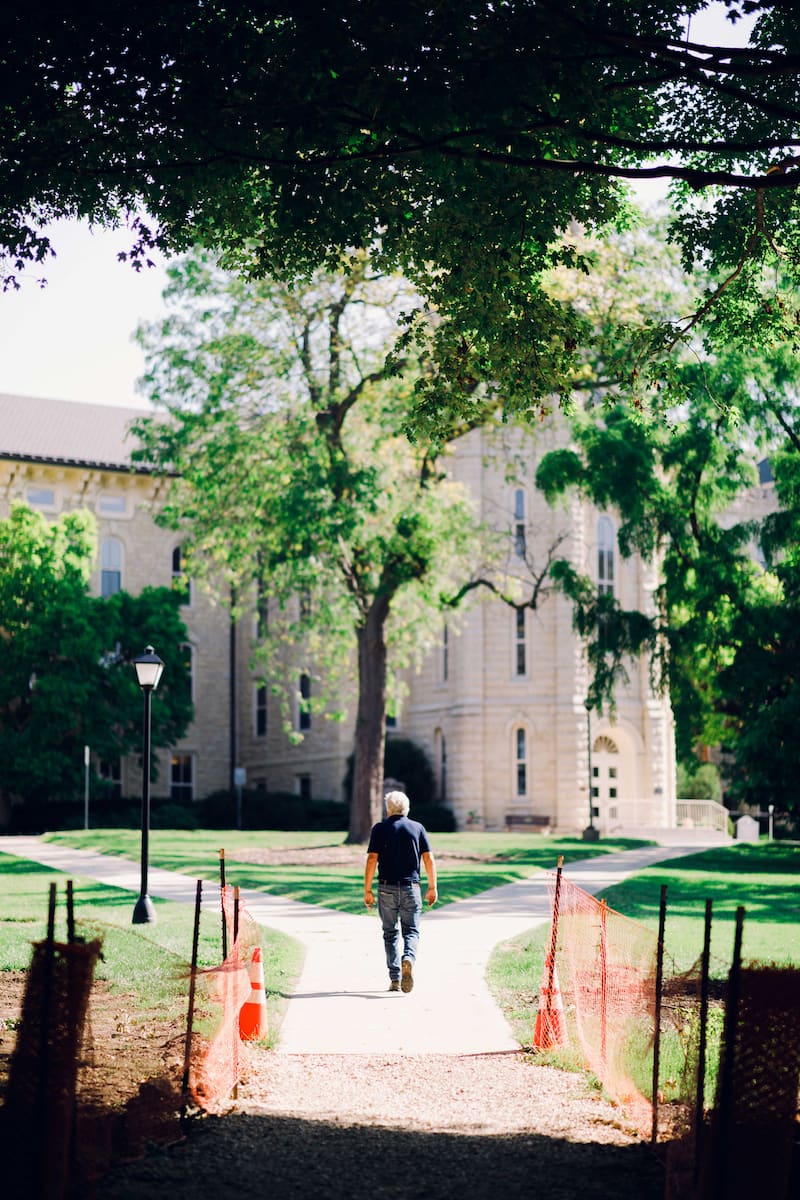
Walking across campus with a vision for bringing beauty on earth as it is in Heaven.
SERVING IN THE DARK
“The Lord God took the man and placed him in the garden of Eden to work it and watch over it” (Gen. 2:15).
The job isn’t all poetry, though. It’s hard work, especially in the winter, when the work of nourishing the earth and its plants is gone for a season. Chicago winters mean treacherously icy walks to class and repeated snowfall, so during this time, the team puts in long hours to keep the campus community safe with cleared and salted sidewalks.
It’s particularly challenging when the day grows dark early and the snow begins piling up hour after hour. Sometimes, the team will work from 4 a.m. to 11 p.m., and the next day they’ll repeat the cycle again, sending faint echoes of scraping shovels up into the residence halls of still-sleeping students. Some days, they see each other more than their families. And while it’s easy to complain about the heavy Illinois winter, Mitchell is thankful for the season, because in such quiet, consistent, and demanding work, the team has new opportunities to support one another.
Mitchell, who also helps coach Wheaton football, sees Landscape Operations as a team, a kind of relationship unlike what he experienced in commercial landscaping with solo routes in his truck. “A lot of these guys love sports. And it’s a team and once someone’s down, we pick each other up. And if someone needs to take a day off or go spend time with their family, you’re going to spend time with your family,” Mitchell said, explaining how the crew thinks about their responsibility to each other. “We’ve got your back.”
Since Mitchell has been working with Landscape Operations for six years, he remembers a time when the team struggled to connect. “There were nights where I would tear up and cry and just ask God, ‘Why am I here? Why am I here at Wheaton College?’” he said.
But when Trayser started leading the team, he began to nurture a team environment of growth and connection. The team became focused on what God had to teach them through the land, and in that space, they started thriving in relationship with one another. After Mitchell lost his father, Chris Mitchell, who was a former director of the Wade Center, he found himself looking to Trayser in moments when he could no longer look to his dad. “I love learning from him. We have meetings and sometimes we don’t even talk about work. We talk about life. He’ll challenge me and I’ll challenge him.” Mitchell leaned forward, “He is the best role model I’ve ever had in my life besides my dad.”
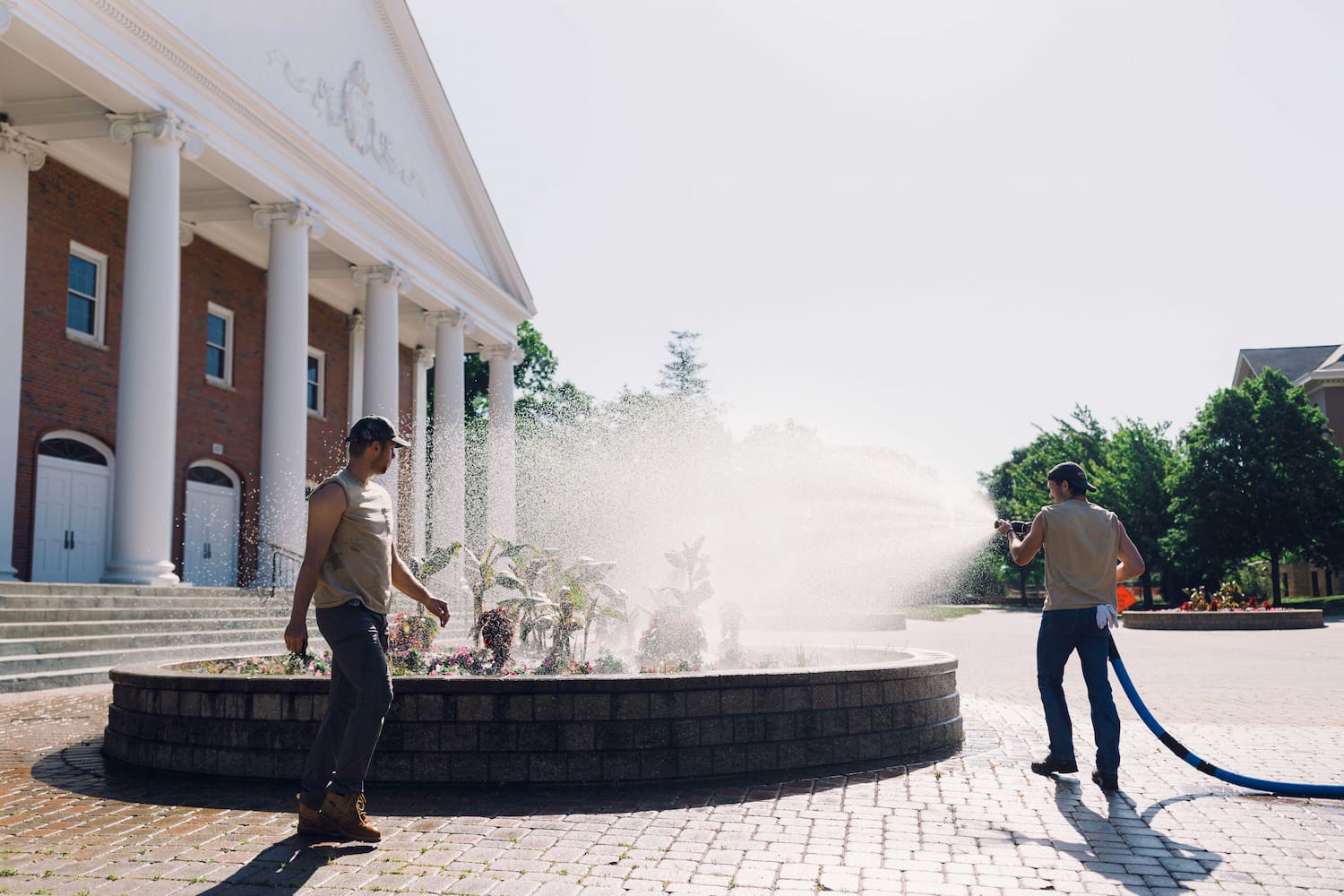
Watering the flower displays outside Edman Chapel.
Wheaton locals Ian Rotherys and Drew Atkinson have worked on Landscape Operations together for several years during summer and winter breaks and have had all sorts of opportunities to invest in friendship. “Ian and I water together,” Atkinson said. “We are in the same truck all day. So I get to hear about his life. He hears about my life. We can pour into each other.”
Since both men recently graduated from college, they’ve been able to share parts of their stories with younger workers who are just starting that phase of their life. “It’s cool to give advice that I learned throughout my time in college, through my time landscaping and just how to take initiative—little things in life that you might need to be successful,” Atkinson reflected. Both Rotherys and Atkinson will carry these lessons into their own next phases of life. Atkinson will teach biology in the fall to high school students ready to listen and learn about what God has made. And Rotherys will begin studying marriage and family therapy at Wheaton to prepare for counseling.
With morning devotionals and work that allows time to talk, there’s a lot of opportunity for learning and encouragement. Of course, Mitchell and Trayser have lessons to share. But lessons aren’t limited to the leaders—Atkinson has been encouraged by Schmid’s story and the impact campus had on him as a new believer. Atkinson recounted Schmid describing how even pulling a weed was glorifying to God. “And I never really thought about that because when we pull weeds, it's not very glamorous, but it has to be done.”
As the winter goes on, the crew’s connections are deepened in the midst of early morning chill, salt on sidewalks, and a certainty that even if they slip and fall, the team has their back. Their trust in one another is reinforced and their bond strengthened, carrying them into spring.
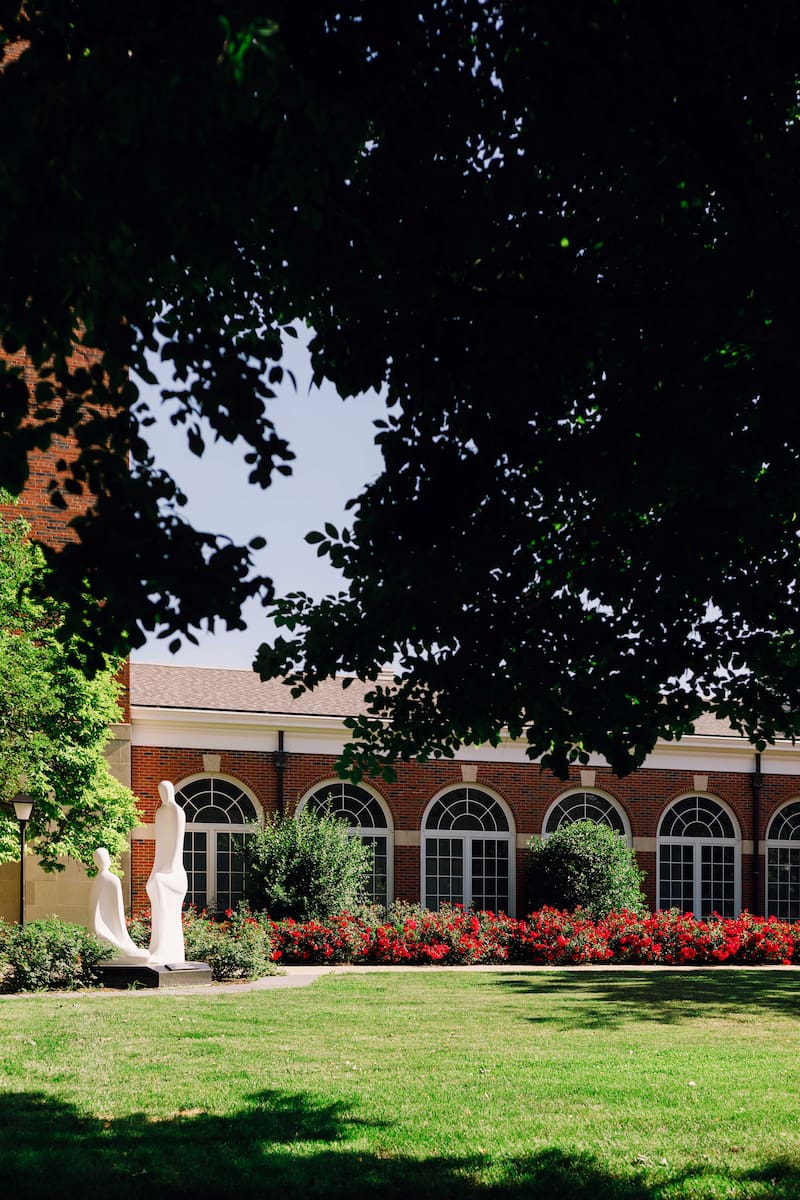
Flowers bloom along the east wing of Edman Chapel.
RESTORING THE VISION
“The Lord God planted a garden in Eden, in the east” (Gen. 2:8a).
As Wheaton’s tulips bloom across campus after spring break, trees start budding to create shade for hammocking students, and magnolia branches unfurl pink flowers outside Blanchard’s windows, campus is painted bright with new moments. It’s a time of remembrance and rejuvenation for the team. With renewed vigor, they jump into work.
There’s a lot of cleanup to be done after the damage of winter and it’s Landscape Operations’ job to restore the land in the spring more than ever. As they do so, new growth serves as a reminder that they have a chance to tend to more than just the earth. “If we can at the same time help one another grow and help one another become more beautiful, then we’re successful,” Trayser said.
And while moving campus closer to Eden can be a lot of pressure, it’s deeply rewarding. Trayser swiveled in his chair, throwing up his arm and placing it on his heart as he leaned back and closed his eyes. “It’s so nourishing,” he said.
As students leave campus in the spring to pursue new paths, the team has their own dreams to match. Not only do they brainstorm different ways to connect students with each other on campus, they also dream of easy to connect with the community outside of the college. Mitchell was honest when he admitted that, for all its idyllic beauty, the College can sometimes feel set apart from the surrounding community. So the Landscape Operations team looks for ways to reach out to others through the land itself.
And yet, Wheaton is also a space overflowing with deep care and hope. Each student that shows up on campus plants a seed there, one that reaches toward others, looking to make a mark on the world—and the staff and faculty work hard to care for the tangling and varied garden that grows as a result.
But if anyone quietly embodies this deep-rooted desire to serve that’s so distinct to Wheaton, it’s the Landscape Operations team. Both faithfulness and excitement characterize their work on campus as they tend the land and gather visions for the future. They move patiently toward Eden, an ongoing dream that leaves them searching for more ways to serve and care for the world around them.
Even I felt this as a student. When I wander campus, I remember dozens of moments where this landscape shaped me. I remember lying on Blanchard lawn and watching the tree branches toss my half-formed prayers up to the sky. I remember staring at the snow falling on the quad late at night when I needed study breaks. I remember the frenzied hope on early spring afternoons as we all dragged blankets outside and lay in the sun, tucking flowers behind our ears. I remember walking slowly among the trees as they turned colors, poems from class still ringing in my ears. I remember skating my way across the pavement to the Wade Center, watching for patches of salt. And I remember night breezes brushing across our faces as we sprawled in the grass, eyes tilted upward, dizzily wondering what would come next, how our stories tumbling against each other here on campus might someday reach out into the world. I remember both quiet and excitement, gentleness and fervor.
But mostly, I remember slowing down and paying attention. In the middle of college turmoil, Wheaton’s grounds are designed to catch the eye, give you a moment to breathe, and ask you to consider the Creator. They are made for remembrance in every moment, at every turn. And remembrance brings hope—a looking forward.


